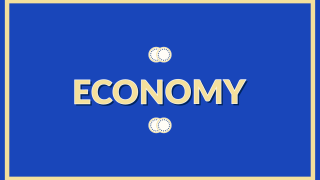Asked how 30,000 Englishmen “subdued” 200 million Indians, Tolstoy responded: “Do not the figures make it clear that it is not the English who have enslaved the Indians, but the Indians who have enslaved themselves?” Something similar appears to be occurring with economic growth in our country.
One of the few issues on which there is near unanimity in Mexico is that of economic growth. We all see the growth of productive activity as a crucial means for creating wealth, generating employment, reducing poverty and inequality, as well as raising the level of the population’s quality of life. Consensus in this sphere is practically universal. However, differences on how to achieve it are as vast as ever.
In the discussion on economic development, there are two great wellsprings: the practical or technical, and the ideological or political. From the technical flank, there is broad consensus on the type of factors or reforms that could contribute to growth of the economy and the debate focuses on the specific content of the legal initiatives that this would require: the fiscal strategy; the investment regimen; the labor law, etc. Some scholars in this field, such as Gordon Hanson, affirm that Mexico has carried out many reforms but that it has not achieved raising the growth rate and that probably what is lacking are small adjustments in several circuits more than grand reforms. If something is clear after thirty years of reforms, it is that the problem does not reside in the reforms themselves.
The ideological and political discussion is very different. On the one hand, we find those who protect and defend specific interests and, on the other, those would construct or reconstruct a determined development model, whether that of the past or of other latitudes. Both contingencies have developed a very ambitious and wide-ranging narrative that seeks to justify and legitimatize the interests or values that lie in the background. Something else that is evident after fifty years of crisis and poor economic performance is that the problem is neither one of nationalism nor one of ideology.
Once in a while, a good read changes the way in which one has been thinking about a determined theme. That happened to me with the book entitled “Bourgeois Dignity”*. Deirdre McCloskey’s argument is that growth is possible not when certain economic and structural conditions come about, but when the creation of wealth acquires legitimacy.
The author reviews the history of numerous countries –such as China, India, Iran, and the Arab nations- that, from the XVIII century, displayed conditions not very distinct from those of England and Holland but that, however, it was in these latter countries that the innovation began that led to capitalist development. The book takes it upon itself to ask why the difference exists and what it is that made the difference possible. The conclusion at which the author arrives is that structural conditions are necessary, but that what makes the difference is legitimacy. Not by chance is the book’s subtitle “Why Economics Can’t Explain the Modern World”. The great change of the last decades, says McCloskey, is that the creation of wealth acquired legitimacy in places such as China and India and this unleashed incommensurable forces and resources that have transformed not only their own nations, but also the world in general. It is in this sense that the author affirms that the true revolution has taken place in the world of ideas and not in that of specific economic reforms. The latter are useful when the former have been resolved.
If we apply the argument to Mexico it would seem evident that although the reforms of the last decades, good or bad, were necessary, the crucial factor was never attended to. In Mexico the concept of wealth does not enjoy legitimacy and those who are responsible for generating it –the entrepreneurs- are perceived more as a blight or as a source of abuse than as the taproot upon which the country’s innovation and development depend. The absence of legitimacy in terms of the entrepreneurial function has many origins but perhaps the most significant is that neither the “technocrats” nor the “ideologues” have been able to revert this order of things. In fact, the narrative of those who advocate more reforms as well as of those who adopt an ideological vision tends to exclude the entrepreneur from the picture. This is what permits and leads to the existing entrepreneur being protected instead of to the creation of an atmosphere of competitiveness that allows the blossoming forth of millions of potential entrepreneurs, including many from the informal economy and “gofers” who, in a different business environment, would have everything to transform the country.
For McCloskey, the idea of a free and worth (in addition to dignified) bourgeoisie is directly correlated with the steam engine, mass marketing, and democracy. It was liberal ideas that created the transformations in the real world because they made possible the existence of a climate of innovation that made the European bourgeoisie flourish, what we now call entrepreneurship. The two central ideas that made the difference according to the author were: that the liberty to hope is a good idea in itself and that a complete economic life should give dignity and even honor to ordinary people.
Markets and innovation have been around from olden times, they are nothing new or novel. What is new in many places is the fact that those who operate in these worlds have acquired legitimacy and the freedom to act. In this regard, the great contribution of this book is that it explains with great perspicuity the manner in which the legitimacy of a social function has the capacity of transforming a nation, much as dogmatism and rigidity (social or political) inhibit it. One of the most interesting and relentless observations of the author is that the liberation that legitimacy entails permits breaking with the social, regulatory, and racial structures that permanently maintain many nations and sectors within their societies poor. Once entrepreneurial creativity acquires legitimacy, everyone can be an entrepreneur and those who take on the challenge end up transforming their lives and their countries.
China began to transform itself when it legitimized capitalism and the entrepreneurial function, even though it did this in oblique fashion. This is the transcendence of the famous saying of Deng Xiaoping in the sense that what is important is not whether the cat is black or white but whether it hunts down mice or, in this case, produces wealth. The Chinese broke with their self-imposed enslavement. When will we?
*Bourgeois Dignity: Why Economics Can’t Explain the Modern World, Chicago University Press, 2010.
Self-Enslavement






Comments